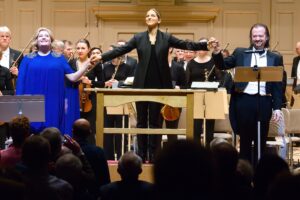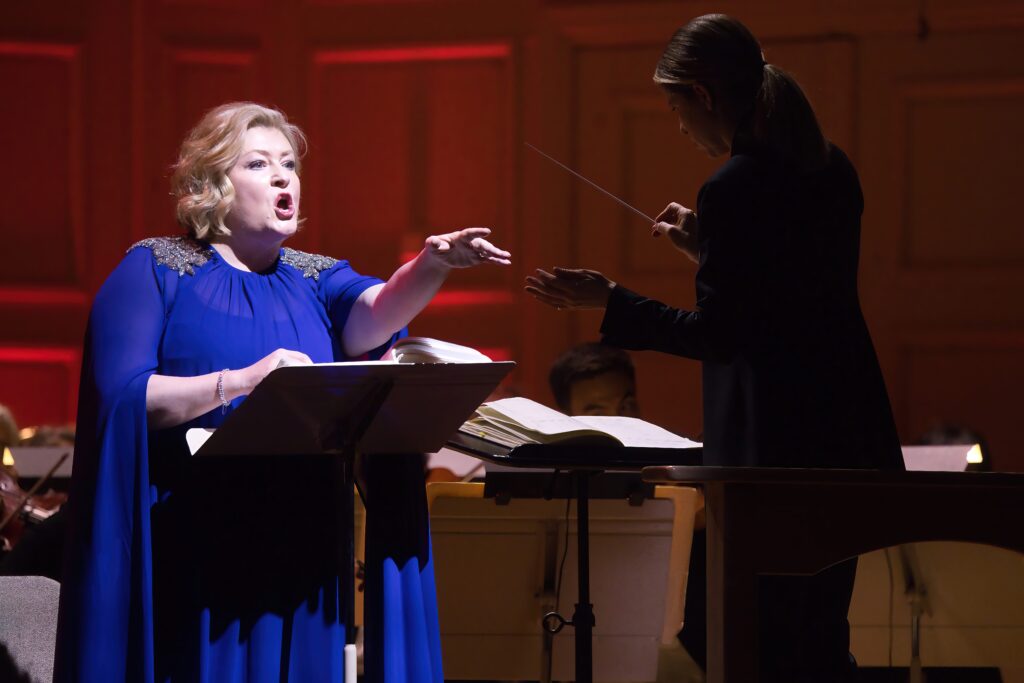
Boston Symphony Orchestra 2023-24 Review: Bluebeard’s Castle
By João Marcos Copertino(Photo credit: Hilary Scott)
Last weekend, Symphony Hall was, on a generous account, less than two-thirds full. If you asked anyone why they were there, nine out of ten people would have said: “to listen to Bártok’s Castle.” The few others would be admirers of Alisa Weilerstein, who played the concert’s first half: Haydn’s c-major cello concerto. Chiaroscuro programing.
Bartók’s psychological thriller of an opera might not be universally beloved, but it certainly has its hardcore fans. Its chilling music, highly dense psychological plot, and superb orchestration justify why this is the only opera in Hungarian to remain in the standard repertoire. The performance was good, but not great, despite the musicians’ best efforts.
First things first. Forget the lousy and apathetic concert version of “Lady Macbeth of Mtsensk” from a few weeks ago. This time, the stage lighting and dramaturgy were ideal for a concert version. Nobody reinvented the wheel; they just did their job right, showing what dramatic competence looks like. The tricks were as old as the Bible—but they worked: red lights for the bloody clouds, all lights turned on for the fifth door, blue lights for most doors. All of the dramatic movements were done as illustrations of the text. It was a concert version in Symphony Hall, not Calixto Bieito’s new production, but that was more than fine.
Another contributing factor was the symphonic quality of Bartók’s opera. It is the kind of opera that makes an orchestra shine. When staged in an opera house, we often do not hear the many beautiful woodwind solos or the sounds of the harp. The BSO musicians captured quite well the lingering harmonic tensions that define this opera and highlighted the complex maze of sounds that usually are hidden in the pit. Nonetheless, the orchestra’s beautiful sound was the pharmakós of the night. We heard them very well—but perhaps we heard them too well? Singers that can be heard in Met Opera’s family circle with ease barely made it to Symphony Hall’s first balcony. It was an anti-voice performance.
It was not conductor Karina Canellakis’s fault. She clearly had a strong technical understanding of the orchestra. Never self-indulgently reveling in the loud sonorities when the singers were singing, her musical direction was precise, technical, and concerned with distinguishing all the solos. Her job was particularly difficult after a last-minute cancellation—more on that later—and with her podium being behind the singers.
If there is something—or someone—to blame, it is the administration’s lack of attention to Symphony Hall’s acoustics. The room is great—phenomenal, actually—and it is one of the best pieces of American concert-hall architecture. But its sound distribution is far from uniform. Any soloist sounds opaque in the corner balconies, and it is only in the second balcony center that one can hear the orchestra sound more cohesively. In addition to that, as any opera-lover knows, an opera house has different acoustic conditions from symphony halls. The former might be even bigger, but they have “drier” reverberations than the latter. That is very important to make it possible for singers to be both heard and understood—even when the text is in Hungarian!
Usually shoebox halls—such as Symphony Hall—find practical solutions to make their acoustics more friendly to vocal performances. The solutions vary. São Paulo Symphony Hall installed a moving ceiling(!); Amsterdam’s gem “Concertgebouw” just puts some velvet curtains at the back of the room when they perform vocal works. There is even the possibility of performing an opera elsewhere, in one of Boston’s many old theaters, like the Radio France Philharmonic does once a year.
Without singers who are minimally audible at most moments of the opera, even great performances are weakened. An opera with inaudible voices is an undoing of what opera is about—and I know no one that would disagree with that. Voiceless, even Maria Ewing’s Salome might perish as a powerless pouncer. Again, this is no shade on any singer’s technique or instrument. It is just that administrators, conductors, and acousticians must think things through when performing opera in Symphony Hall.

The hardest vocal job of the night certainly was in Karen Cargill’s throat. The Scottish mezzo-soprano is a very particular kind of singer: an intellectual one. More than a commentary on a musician’s capacities of reflection—to my mind, any one performing at Symphony Hall is gifted in their own right—, it is an observation on how they conceive of their musical interpretation. Cargill sang Judith as if she had meticulously calculated all her characters’ movements for years. Her performance lacked some illusion of spontaneity, but I think she could compellingly lecture me for hours about any measure of the score.
In Judith, Cargill found an initially naïve woman who faces the costs of her idealism. In some ways, her Judith is barren of any erotic desire; her attraction to Bluebeard is based on the mesmerizing powers of a figure that she does not understand. By the time we reach the fifth door, we see the fear in her eyes as she realizes that she has married someone who has values vastly different from hers.
The acoustic issues of the night enhanced that perception. Her high C was shamefully inaudible, but her gestures were not. There was something moving in seeing a voice seethed in the whole universe of Bluebeard’s orchestra. Interestingly, Cargill’s voice carries well in piano sounds when she sings with a bit more air—and a bit more vibrato—, providing a special sense of vulnerability (especially in the scene when they arrive at the castle).
In such an intellectual approach to the role—and in less-than-optimal acoustic conditions—, the more emotionally explicit moments of the opera might have been out of reach for her. The tense exchange in front of the sixth door was a bit too recherché. Her crying to have the keys was more conspicuous than her A and A-flat at the end of the scene. The lack of spontaneity also undermined the emotional impulsiveness.
Bass-Baryton Nathan Berg filled in at the last minute as Bluebeard, replacing an ill Johannes Martin Kränzle. The role is not easy, but it is certainly not as difficult as Judith’s. Still, to quickly step in like that is a task with many risks. In the first night, it was easy to see that, even though prepared, Berg had not sung the role with an orchestra for a while. He hardly moved his eyes away from the score and tried to mask any shortcoming. One thing is certain, the simple fact that he made the night with just his score, a water bottle, and his instrument is a victory.
I found him significantly more in his element on Saturday night. His laid back, and genuine reactions on stage might have been more than adequate for a concert version, but prejudicated the overly concerned and gestural acting of Cargill. Nevertheless, he often reacted as if amazed by her art. He produced a few congenial smiles that might have been his or might have been Bluebeard’s.
Vocally, his voice seems proper for the role, but necessarily overwhelming. Some scenes were more interesting than others. He was no match for the pleno organ in the fifth door—but who would be? In the torture chamber there was a sense of shame in his voice that made Bluebeard a bit more vulnerable than usual. As the night went on, his singing sounded more idiomatic and organic. Berg reacted well in answering Cargill’s lyrical intonations with a less monstrous man than is usual for the role. There was a speaking quality in his delivery that often made some of the verses surprising. I speak no Hungarian, but that is precisely the point of some operas. More than accessing the language itself, it is important to feel as if there is a meaning behind it—especially when in America where most do not speak Italian, Russian, French, or German.
Speaking of language, the prologue of the opera was performed in English by Jeremiah Kissel. The text was comprehensible and the translation (“Once upon a time…”) might have overstressed the fairy tale element of the opera, neglecting the psychological subtext. I would appreciate a more understated or macabre reading—something that brings a sense of estrangement instead of familiarity with the narrative formula. Still, it worked. Maybe it would work better in Hungarian.
Overall, BSO’s “Bluebeard’s Castle” provided a good time to its audience. But it also revealed some underscored problems of opera when in a symphony hall: it is great to hear the orchestra, but wouldn’t it be better to also hear the voices?


